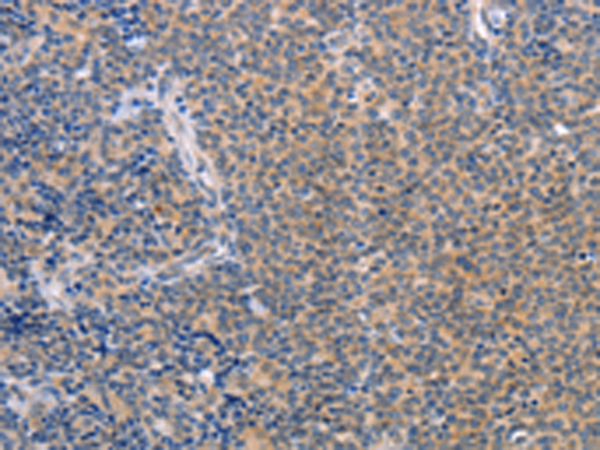


| WB | 咨询技术 | Human,Mouse,Rat |
| IF | 咨询技术 | Human,Mouse,Rat |
| IHC | 1/50-1/200 | Human,Mouse,Rat |
| ICC | 技术咨询 | Human,Mouse,Rat |
| FCM | 咨询技术 | Human,Mouse,Rat |
| Elisa | 1/2000-1/5000 | Human,Mouse,Rat |
| Aliases | LEC; LMC; NCC4; CKb12; HCC-4; LCC-1; Mtn-1; NCC-4; SCYL4; ILINCK; SCYA16 |
| WB Predicted band size | 14 kDa |
| Host/Isotype | Rabbit IgG |
| Antibody Type | Primary antibody |
| Storage | Store at 4°C short term. Aliquot and store at -20°C long term. Avoid freeze/thaw cycles. |
| Species Reactivity | Human |
| Immunogen | Synthetic peptide of human CCL16 |
| Formulation | Purified antibody in PBS with 0.05% sodium azide and 50% glycerol. |
+ +
以下是关于CCL16抗体的3篇参考文献及其摘要概括:
---
1. **文献名称**:*CCL16 promotes liver fibrosis by orchestrating macrophage infiltration and polarization in mice*
**作者**:Li, X., et al.
**摘要**:该研究利用抗CCL16中和抗体,在小鼠肝纤维化模型中验证了CCL16通过招募M2型巨噬细胞加剧纤维化进程。抗体阻断显著减少胶原沉积,提示靶向CCL16的治疗潜力。
---
2. **文献名称**:*Anti-CCL16 antibody inhibits tumor growth by modulating the immune microenvironment in colorectal cancer*
**作者**:Wang, Y., et al.
**摘要**:研究发现CCL16在结直肠癌组织中高表达,并与Treg细胞浸润相关。使用抗CCL16单克隆抗体治疗后,肿瘤微环境中抑制性免疫细胞减少,CD8+ T细胞活性增强,抑制了肿瘤进展。
---
3. **文献名称**:*CCL16 modulates dendritic cell function in autoimmune encephalomyelitis*
**作者**:Müller, G., et al.
**摘要**:该文通过抗CCL16抗体阻断实验,揭示了CCL16在多发性硬化小鼠模型中促进树突状细胞迁移至中枢神经系统的机制,抗体干预有效减轻了神经炎症和脱髓鞘损伤。
---
以上文献均聚焦于CCL16抗体的功能研究,涵盖肝纤维化、肿瘤免疫及自身免疫疾病领域,展示了抗体在机制解析和潜在治疗中的应用。如需具体DOI或年份信息可进一步补充。
CCL16 (C-C motif chemokine ligand 16), also known as HCC-4 or NCC-4. is a small cytokine belonging to the CC chemokine family. It is encoded by the *CCL16* gene in humans and is primarily expressed in the liver, with lower levels detected in the spleen, lungs, and bone marrow. CCL16 functions as a chemoattractant for immune cells, including monocytes, T lymphocytes, and dendritic cells, by binding to chemokine receptors such as CCR1. CCR2. CCR5. and CCR8. Its role in immune regulation links it to inflammatory processes, tissue repair, and disease pathogenesis, such as chronic inflammation, fibrosis, and cancer.
Antibodies targeting CCL16 are essential tools for studying its expression, localization, and interactions. These antibodies (monoclonal or polyclonal) are typically developed using immunogenic peptides or recombinant CCL16 protein. They enable applications like ELISA, flow cytometry, and immunohistochemistry to quantify CCL16 levels in biological samples or visualize its distribution in tissues. In therapeutic contexts, neutralizing CCL16 antibodies have been explored to inhibit its pro-inflammatory or tumor-promoting effects, particularly in diseases where CCL16 overexpression correlates with pathology.
Current research focuses on clarifying CCL16's dual roles in homeostasis and disease, as well as optimizing antibody-based strategies for diagnostic or therapeutic use. Challenges include understanding its splice variants and post-translational modifications, which may influence antibody specificity. Studies in preclinical models continue to evaluate the efficacy of anti-CCL16 agents in modulating immune responses and disease progression.
×